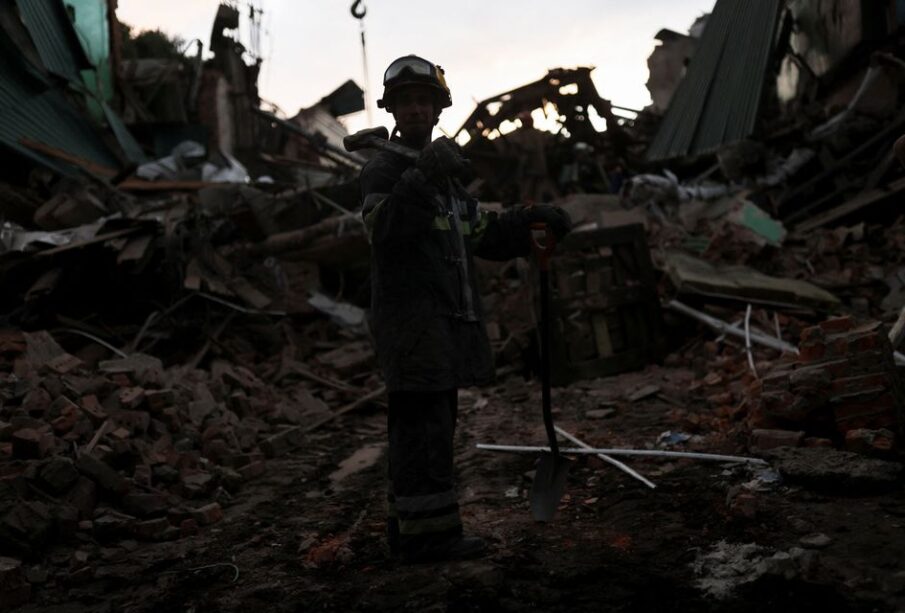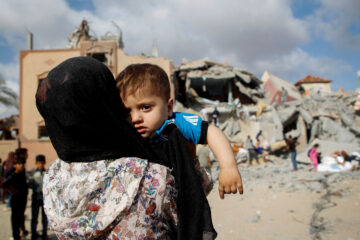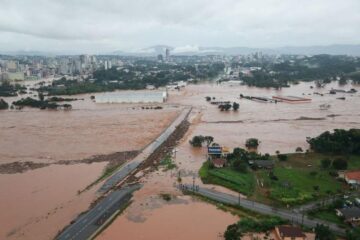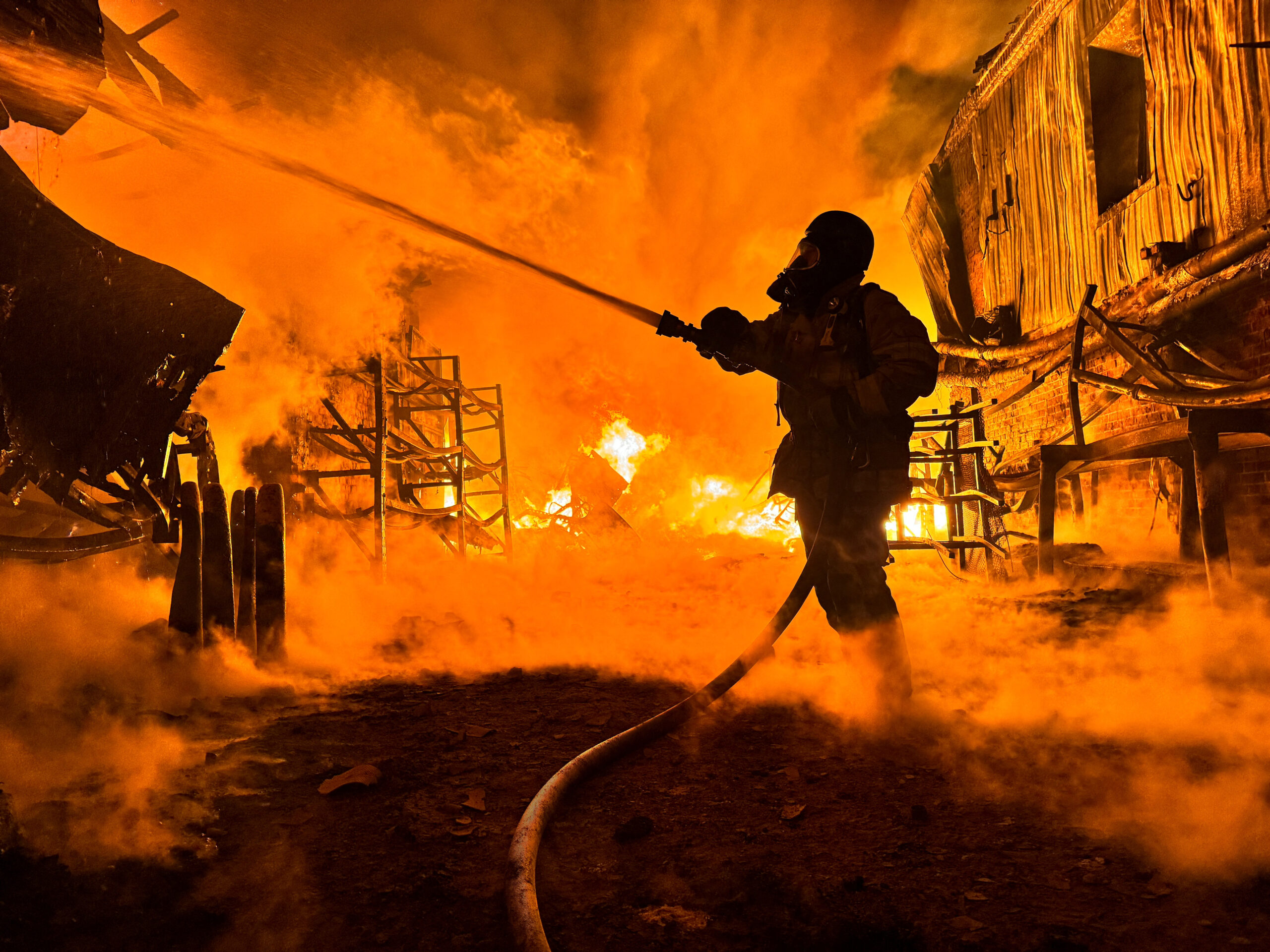Russian gas cut to Europe hits economic hopes, Ukraine reports attacks on coastal regions
 A firefighter stands as his colleagues remove debris to find bodies of people at the Central House of Culture, after a military strike hit a building, as Russia's invasion of Ukraine continues, in Chuhuiv, in Kharkiv region, Ukraine July 25, 2022. REUTERS/Nacho Doce
A firefighter stands as his colleagues remove debris to find bodies of people at the Central House of Culture, after a military strike hit a building, as Russia's invasion of Ukraine continues, in Chuhuiv, in Kharkiv region, Ukraine July 25, 2022. REUTERS/Nacho DoceRussia said it will cut gas supplies to Europe from Wednesday in a blow to countries that have backed Ukraine, while missile attacks in Black Sea coastal regions raised doubts about whether Russia will stick to a deal to let Ukraine export grain.
The first ships from Ukraine may set sail in days under a deal agreed on Friday, the United Nations said, despite a Russian missile attack on the Ukrainian port of Odesa over the weekend, and a spokesman for the military administration in the saying another missile had hit the Odesa region on Tuesday morning.
Soaring energy costs and the threat of hunger faced by millions in poorer nations show how the biggest conflict in Europe since World War Two, now in its sixth month, is having an impact far beyond Ukraine.
European Union countries are set to approve on Tuesday a weakened emergency proposal to curb their gas demand as they try to wean themselves off Russian energy and prepare for a possible total cut-off.
The Ukrainian military on Tuesday reported Russian cruise missile strikes in the south and that Ukrainian forces had hit enemy targets. Serhiy Bratchuk, a spokesman from the military administration in Odesa, told a Ukrainian television channel that a missile fired from the direction of the Black Sea had struck the region, but gave no information on casualties.
East of Odesa along the Black Sea coast, port infrastructure at Mykolaiv was damaged by an attack, according to the mayor Oleksandr Senkevich.
Russia’s defense ministry did not immediately reply to an out-of-hours request for comment.
A major fire broke out at an oil depot in the Budyonnovsky district of Russian-backed Donetsk People’s Republic in eastern Ukraine after Ukrainian troops shelled the province, Russia’s TASS reported, quoting a reporter at the scene. No casualties or injuries have been reported.
Russian energy giant Gazprom (GAZP.MM), citing instructions from an industry watchdog, on Monday said gas flows to Germany through the Nord Stream 1 pipeline would fall to 33 million cubic metres per day from Wednesday.
That is half of the current flows, which are already only 40% of normal capacity. Prior to the war, Europe imported about 40% of its gas and 30% of its oil from Russia.
The Kremlin says the gas disruption is the result of maintenance issues and Western sanctions, while the European Union has accused Russia of energy blackmail.
Politicians in Europe have repeatedly said Russia could cut off gas this winter, a step that would thrust Germany into recession and hurt consumers already hit by soaring inflation.
Moscow says it is not interested in a complete stoppage of gas supplies to Europe.
Adding to concerns on the energy front, the Ukrainian state pipeline operator company said Russian gas giant Gazprom (GAZP.MM) without prior notice has increased pressure sharply in a pipeline that runs through Ukraine to deliver Russian gas to Europe.
Such pressure spikes could lead to emergencies including pipeline ruptures, and pipeline operators are obliged to inform each other about them in advance, the Ukrainian company said. Gazprom could not be immediately reached for comment.
GRAIN SHIPS
Before the invasion and subsequent sanctions, Russia and Ukraine accounted for nearly a third of global wheat exports.
Officials from Russia, Turkey, Ukraine and the United Nations agreed on Friday there would be no attacks on merchant ships moving through the Black Sea to Turkey’s Bosphorus Strait and on to markets.
Moscow brushed aside concerns the deal could be derailed by a Russian attack on Odesa on Saturday, saying it targeted only military infrastructure.
The White House said the strike cast doubt on Russia’s credibility and was watching closely to see if commitments would be fulfilled.
“We will also continue to actively explore other options with the international community to increase Ukraine exports through overland routes,” it said.
Russia’s Black Sea fleet has blocked grain exports from Ukraine since Moscow’s Feb. 24 invasion. Moscow blames Western sanctions for slowing its food and fertiliser exports and Ukraine for mining the approaches to its ports.
Under Friday’s deal, pilots will guide ships along safe channels through the naval minefields.
A Ukrainian government official said he hoped the first grain shipment could be made from Chornomorsk this week, with shipments from other ports within two weeks.
Zelenskiy was adamant that trade would resume: “We will start exporting, and let the partners take care of security,” he said.
Russian Foreign Minister Sergei Lavrov, on a tour of African countries, said there were no barriers to the export of grain and nothing in the deal prevented Moscow from attacking military infrastructure.
The Kremlin also said the United Nations must ensure curbs on Russian fertiliser and other exports were lifted for the grain deal to work.
AIR STRIKES
The Kremlin says it is engaged in a “special military operation” to demilitarise and “denazify” Ukraine. Both Kyiv and Western nations say the war is an unprovoked act of aggression.
Thousands of civilians have died and millions have fled during the war. Russian artillery barrages and air strikes have pulverised cities.
With Western weapons boosting the Ukrainians, Putin’s forces are making slow progress but they are believed to be readying for a new push in the east.
Ukraine said on Monday its forces had used U.S-supplied HIMARS rocket systems to destroy 50 Russian ammunition depots since receiving the weapons last month.
Russia did not comment but its Defence Ministry said its forces had destroyed an ammunition depot for HIMARS systems.
SOURCE: REUTERS









